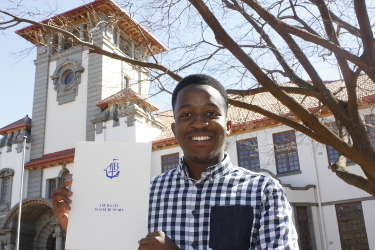Latest News Archive
Please select Category, Year, and then Month to display items
12 October 2020
|
Story Arina Engelbrecht
|
Photo Supplied
 Arina Engelbrecht from Organisational Development and Employee Well-being believes physical activity has a number of benefits for one’s health, including stress relief.
Arina Engelbrecht from Organisational Development and Employee Well-being believes physical activity has a number of benefits for one’s health, including stress relief.
Being physically active plays a big role in preventing the development of mental-health problems and in improving the quality of life of people experiencing mental-health problems.
Treatment for depression
Physical activity can be an alternative treatment for depression. It can be used as a stand-alone treatment or in combination with medication and/or psychological therapy. It promotes all kinds of changes in the brain, including neural growth, reduced inflammation, and new activity patterns are formed that promote feelings of calm and well-being. It releases endorphins – powerful chemicals in the brain that energise your spirit and make you feel good.
Physical activity can be very effective in relieving stress. Research in adults has found that physically active individuals tend to have lower stress levels compared to individuals who are less active. It also leads to improved sleep. When a person sleeps better and feels more rested, overall quality of life improves. They cope better with daily life stressors.
Reduce Alzheimer's risk
Regular physical activity can reduce your risk of developing Alzheimer's disease by up to 50%. It can also slow down further deterioration in those who have already started to develop cognitive problems. It stimulates the brain’s ability to maintain old connections as well as to make new ones.
A study asked people to rate their mood immediately after periods of physical activity (e.g. going for a walk/run, cycling, doing housework) and periods of inactivity (e.g. reading a book or watching television). Researchers found that participants felt more content, more awake, and calmer after being physically active compared to after periods of inactivity.
In conclusion, people who are physically active feel a sense of well-being, feel more energetic throughout the day, sleep better at night, have sharper memories, and feel more relaxed and positive about themselves and their lives.
“Being physically active not only changes your body, it changes your mind,
attitude, and your mood.” – Arina Engelbrecht
Perseverance is key for 2017 Abe Bailey recipient
2017-08-23

Gosego Moroka, recipient of the 2017 Abe Bailey Travel Bursary,
says his never-say-die attitude is what helped him win the bursary
the second time round.
Photo: Rulanzen Martin
A valuable life lesson can be learned from Gosego Moroka. The fourth-year LLB student was in the top three for the 2016 Abe Bailey Travel Bursary which was awarded to Candice Thickeson. And now in 2017 Moroka is the recipient.
“It means the world to me as it shows that perseverance is the key. I took last year’s loss as a lesson which I would use to improve as a candidate this year and I’m ecstatic that it came full circle.”
Bursary aims to broaden views
The educational tour will start on 21 November 2017. “We will be travelling to the African Union in Addis Ababa, Ethiopia, and then to London, Oxford and Cambridge universities in England, as well as Edinburgh University in Scotland,” Moroka says. The tour group will be hosted by Goodenough College in England. The bursary aims to broaden the views of young South Africans by providing outstanding students the opportunity to engage with students from other universities.
Comprehensive application process
The application process starts with a motivation letter by the applicants stating the reason for applying. They must then submit letters detailing their leadership roles in the community, school, and at university. This is followed by an interview process. “The university will recommend three persons as possible bursars,” Moroka says. The Abe Bailey Trust will then, with the recommendation of the university, make its own decision in selecting the successful candidate.
Great achievement adds to repertoire
“This achievement was extremely important to me as it is testament that greatness is something one works towards.” Moroka is a former 100m South African champion and is part of the Golden Key International Honour Society. And now he is an Abe Bailey Bursar.